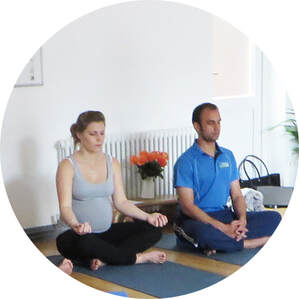 A common question, often when you are getting going with it. What's my response? Well it depends on your aims and needs and what other life commitments you already have. Regular is good, but more is not always better. I practice yoga every morning, before the day gets going. Before the kids are awake and when the house is still relatively quiet. I get up and take to my mat or whatever space is available if I'm not at home. I take asana (yoga postures), pranayama (breathwork) and then sit in meditation. This is my foundation, and it feels essential with teenagers in the house. It's not a chore, I love it and miss it if I don't do it. Is a weekly yoga practice enough A weekly practice provides a regular, intimate contact with yourself, your health and wellbeing. Spending time with a close connection to your body, your breath, your mind, Moving your body in ways that support your physical and mental health, breathing well and allowing space for the mind to quieten. Is daily yoga practice a good idea?I encourage my students to take practice in between classes. I provide short practice handouts based on what we do in class, and offer advice to support them in developing their own home practice. This doesn't work for everyone, but even 10 minutes a day can be a brilliant addition to your day. A daily practice is different to a weekly class. The daily practice is more intimate - you are there connecting with your body, breath and mind more often so the relationship with yourself becomes more refined. Your understanding of your body each day will develop, along with the understanding of your breath and mind and the thought patterns you begin to notice. I have a course that is set up to help you develop a regular home practice if this sounds appealing to you: Home practice course > Is there such a thing as too much yoga practice? I've certainly come across keen yoga practitioners who do a lot of yoga practice, sometimes several hours a day. Anything can be taken to extremes so of course that is true with yoga practice as well. Equally there are those who have a modest daily practice who find it invaluable. How much do you actually need to gain the benefits you seek. And how much is your ego telling you more is better or being competitive with yourself or others? How will I know what suits me?It might not be the quantity of the yoga techniques that is being practiced but perhaps what has been chosen to practice. A yoga teacher is a great resource to help you find a suitable practice. Ensure that the teacher you choose is experienced and isn't just about fitness and getting stronger and more flexible. There is more to yoga and more to life.
Anything is better than nothing, but too much might not be as helpful as you think...
0 Comments
 Yoga is great for improving our health and wellbeing. A well trained teacher will ensure that the class is safe and suitable for all participants. But yoga injuries do happen, and here are my top tips to ensure your yoga practice remains safe and enjoyable. 1) Listen to your body Yoga shouldn’t hurt. If it doesn't feel right, or your starting to feel strain in a vulnerable part of the body (e.g your knees, neck or lower back) then ease off and take a breather. Your body is yours so take care of it and work within safe limits, especially while you are getting started. 2) Start gently and build it up Don't go to your first class expecting to do everything. Whether you are seeking physical strength or improved breathing, connecting with yourself, focus, or relieving stress, there is no magic wand or quick fix to achieve these aims. Incremental changes will happen, and allowing yourself time to add challenges and layers of technique as you get used to the practices will bring the most benefit. Everyone has limitations, so be gentle with yourself and don’t be tempted to push it too soon. 3) Regular practice If you drop in to a class from time to time, your body will always be starting from the beginning and if there are any vulnerabilities, they are more likely to flare up. Regular practice will allow you to develop strength and stamina so that you can then further your practice. If issues or niggling pains do start to emerge, you'll have time to understand what triggers them and find ways around them. 4) Talk to your teacher Your teacher should be well-trained in a wide-range of injuries and ways to adapt the postures and techniques to suit you. Not all yoga teachers have this training (especially is they took their training over just a few weeks or months where they may only have covered postures, choreography and basic anatomy). Make sure your teacher understands any injuries or past vulnerabilities that you have so they can suggest alternatives or adaptations. You need to take some responsibility here and pro-actively talk to your teacher to ensure they can support you. 5) Yoga should never hurt Worth saying twice. Really. If it hurts, your body isn’t ready to go that deeply into it so ease off. Yoga classes aren’t (or shouldn’t be) competitive. Just because your neighbour on the mat next to you can do it, it doesn’t mean you should be able to. The class is there to benefit you, and every body in the class is different. So do things that will be helpful and have the wisdom and patience to know when to rest and wait for the next pose. Enjoy safe yoga practice and you will reap the rewards for years to come!  The debate is ongoing, should yoga be considered for the Olympic games? Yoga competitions have been held for over a century, and there are many yoga practitioners who would support the competitive yoga movement. But equally many of the teachings of yoga philosophy, and many of the reasons some are drawn to the practice of yoga, work away from the notion of it being competitive. Many people practice yoga precisely because you aren't in competition and it allows you space to escape from the daily struggle. You nurture the uncompetitive side of you, where you work at your own level, your own pace, challenging yourself to develop health, strength, mental and physical wellbeing and perhaps spiritual grounding and space. But there are many varied reasons for people to practice yoga, and for some it is largely athetic. The practice that most of us see in classes, on DVDs and in our home practice, is athletic. Physical exercises to stretch, strengthen, develop stamina and stability. This is the visible side of yoga, the performance of yoga postures (asana). The rest of the yoga teachings are largely invisible, not aimed at spectators. Teachings about attitudes, lifestyle, reflection, breath control, meditation. To sit cross-legged and see who can regulate the breathing well, or become realised and enlightened might not make great viewing! Yoga is different things to different people, and none of them need conflict. For some it is physical development and mastery, discipline, challenge, and these could all be aligned with developing the competitions of yoga into more formal Olympic Sport. It would be interesting to consider how the rules might differ from the rules of gymnatics. The development of yoga asana has been quite influenced by the physical culture of gymnastics so there is certainly cross over that would need to be carefully defined. The commercial side would have to be considered too. Yoga is big business, Bikram yoga has packaged and presented yoga into a neat and simple kit that has been rolled out globally and which affords him a forecourt full of Rolls Royces and diamond encrusted Rolexs. The posture sequence would surely complement his copyrighted sequence as he is in the forefront of promoting it as an Olympic Sport. So the motivation of Yoga as Sport and who governs the sport would need to be considered. There are pros and cons of course. - Making it into a mainstream sport could encourage participation which then may lead practitioners beyond the physical into the deeper teachings. Many have discovered the joy of yoga practice through the appeal of an athetic practice. - It could also work the other way, simplifying it and reducing it to a sport, losing too much along the way. I'm not a supporter of the Olympic Yoga movement. More and more people are discovering yoga in their own way and it seems to have momentum of its own. The practice of yoga is already more athletic than anything else in most classes. Yet the teachings and experience of a fuller yoga practice speaks for themself. Olympic yoga could easily put off those who aren't competitive. The idea of competing to be 'better' than someone else at yoga is exactly what Patanjali's Yoga Sutras, one of the essential ancient texts depicting the teachings of yoga, warn against as one of the pitfalls along the path of self development. A dead end that could take up all our energy until we realise too late that we have missed the point. Back to YogaSpace homepage You don't immediately think of the Olympics or yoga championships when you think of yoga. But there is a small but growing movement for encouraging competition in yoga with yoga celebrities like Bikram Choudhury at the forefront of the movement.
Yoga competitions currently judge asana (postures) based on strength, flexibility, alignment, difficulty of the poses demonstrated and overall demeanour and execution. More about it in the emerging trend and Olympic Yoga aspirations in this interesting article in the Telegraph this week. The arguments against competition in yoga are relatively obvious. For a long time, and now more than ever, the tools and techniques of yoga have been used for individual development. Using bodywork, breathing, study, meditation etc. with personal aims that will be different from one person to the next. You might be at your group yoga class working on an old back injury that your yoga practice helps, the person next to you in a class may be settling an over anxious mind. How can there be a competition in this? But to reject the notion of yoga as an Olympic sport as an obviously ludicrous notion perhaps could be short-sighted. If you agree that the more people who practice yoga the better, and that the benefits to practicing yoga are widespread and adaptable and have lots to offer people from all walks of life, then it naturally follow on on from that that the more people who know about yoga the better - and what better way to get to know about it than seeing it on TV in the Olympics? Of course that is a simplistic argument, and what you would see on TV would be a range of twisted bodies doing gymnastic type moves. But it could pique curiousity, and be followed up by perhaps venturing to a yoga class to find out more about it. The onus is then on yoga teachers to gradually introduce the student in to the full range of potential that yoga has to offer. Perhaps this could inspire a new wave of people to try yoga, or perhaps it would just foster more spectator participation which really would miss the point. The physical beauty that makes up one of the aspects of yoga does deserve spectators. BKS Iyengar emphasises this in his approach to teaching as a way to encourage uptake and participation. So perhaps Olympic Yoga a natural extension of this? Patanjali would almost certainly disapprove and have no interest in this as a pursuit. In the Yoga Sutras he warns against getting caught up in the physical comforts that yoga can bring, seeing it as a big potential pitfall. But in the West the physical benefits are the typical starting point for anyone trying yoga. That is the reason for getting involved. So perhaps Olympic yoga isn't as far off as perhaps we might think it is, and not as ludicrous as it initially sounds. |
More blog articles >Categories
All
Archives
July 2024
|
|
Bristol YogaSpace Ltd
Princes Place, Bishopston Just off Gloucester Road Bristol BS7 8NP |
|


 RSS Feed
RSS Feed

